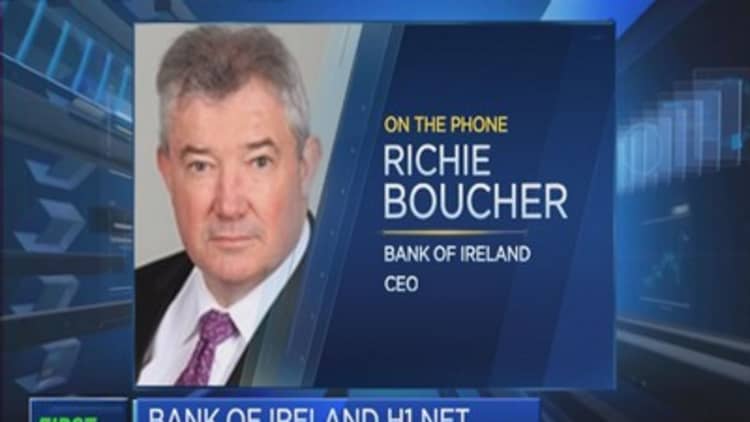
Bank of Ireland, the Irish bank that was bailed out during the country's debt crisis, reported soaring profits for the first half of 2015 as bad debts at the bank were reduced.
The bank's profits doubled to 743 million euros (£814 million) compared to the same time in 2014.
Richie Boucher, chief executive of the Bank of Ireland, told CNBC there was "good momentum" in the business.
He was also optimistic about increased consumer spending in Ireland, which has become something of a poster boy for austerity after returning to growth and repaying its international debtors ahead of schedule.
"We've seen a recovery in domestic demand and consumer confidence in the last 12-15 months," he told CNBC.
Ireland's economy is seen growing 3.6 percent in 2015 and 3.5 percent in 2016, according to the European Commission.
Bank of Ireland boosted lending to small businesses, although this comes after years where small business lending stagnated.
Boucher said that Bank of Ireland was now the biggest lender to Irish businesses and was approving more than 50 percent of non-property loans.
Bank of Ireland was recently part of a consortium with U.S. financial companies Goldman Sachs and CarVal, which bought a parcel of Irish loans from U.K. bank Lloyds for £827 million.
"Non-performing loans are coming down, which is a big factor in our growth," Boucher said.
Boucher also left open the possibility of buying up more loans.
"Where there are portfolios in the market, which meet our criteria, that is more the cream on the cake," he said.
A U.K. exit from the European Union would not affect the Bank of Ireland's U.K. interests, which include Post Office lending, he argued.
Its Irish business should be able to cope with the potential fallout, Boucher said.
"There's very strong commercial relationships between the two countries, so the continued success of the British economy is very important to us. It's hard to speculate what would happen, but we think our business model is quite resilient to events like that," Boucher said.
- By CNBC's Catherine Boyle




